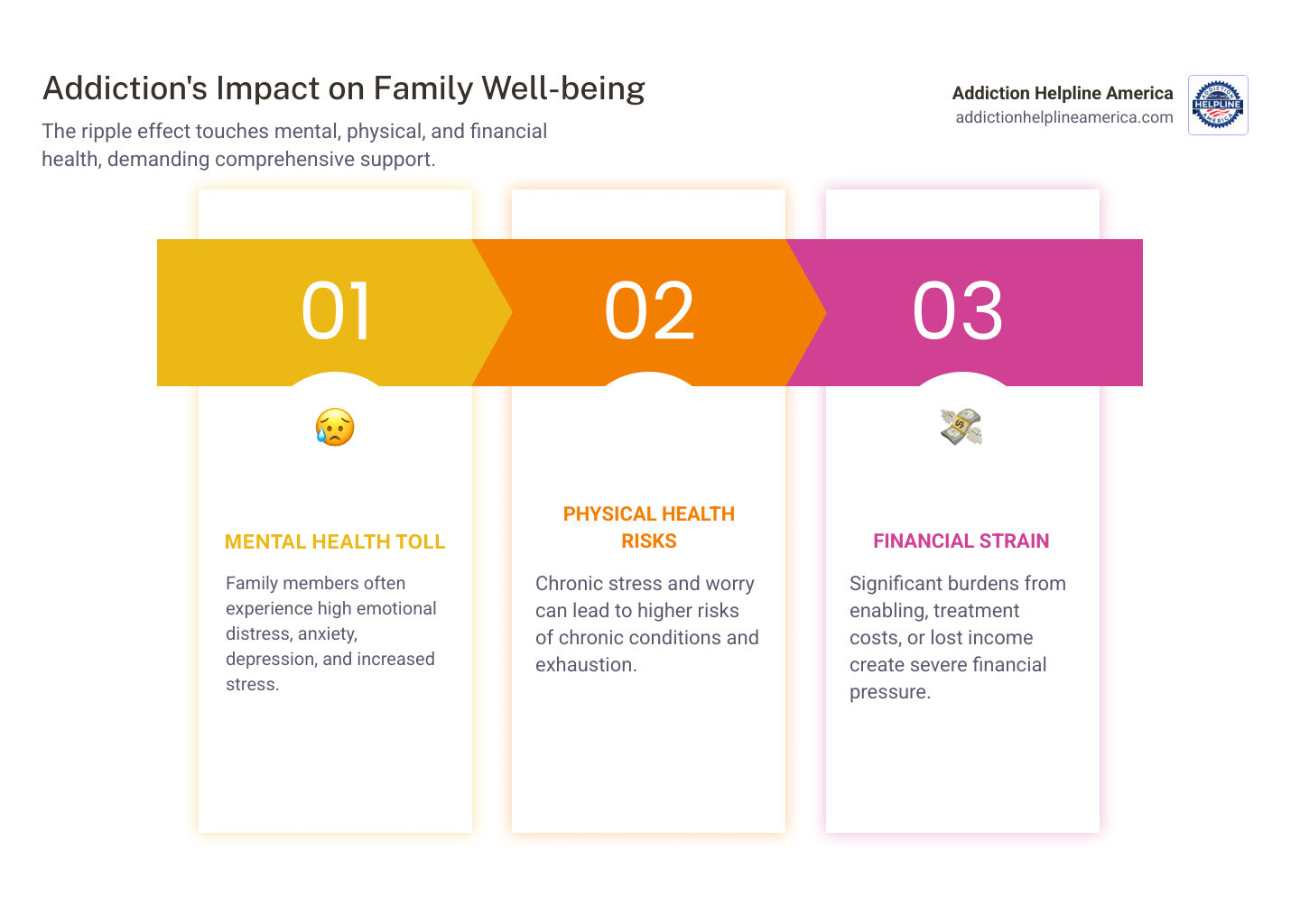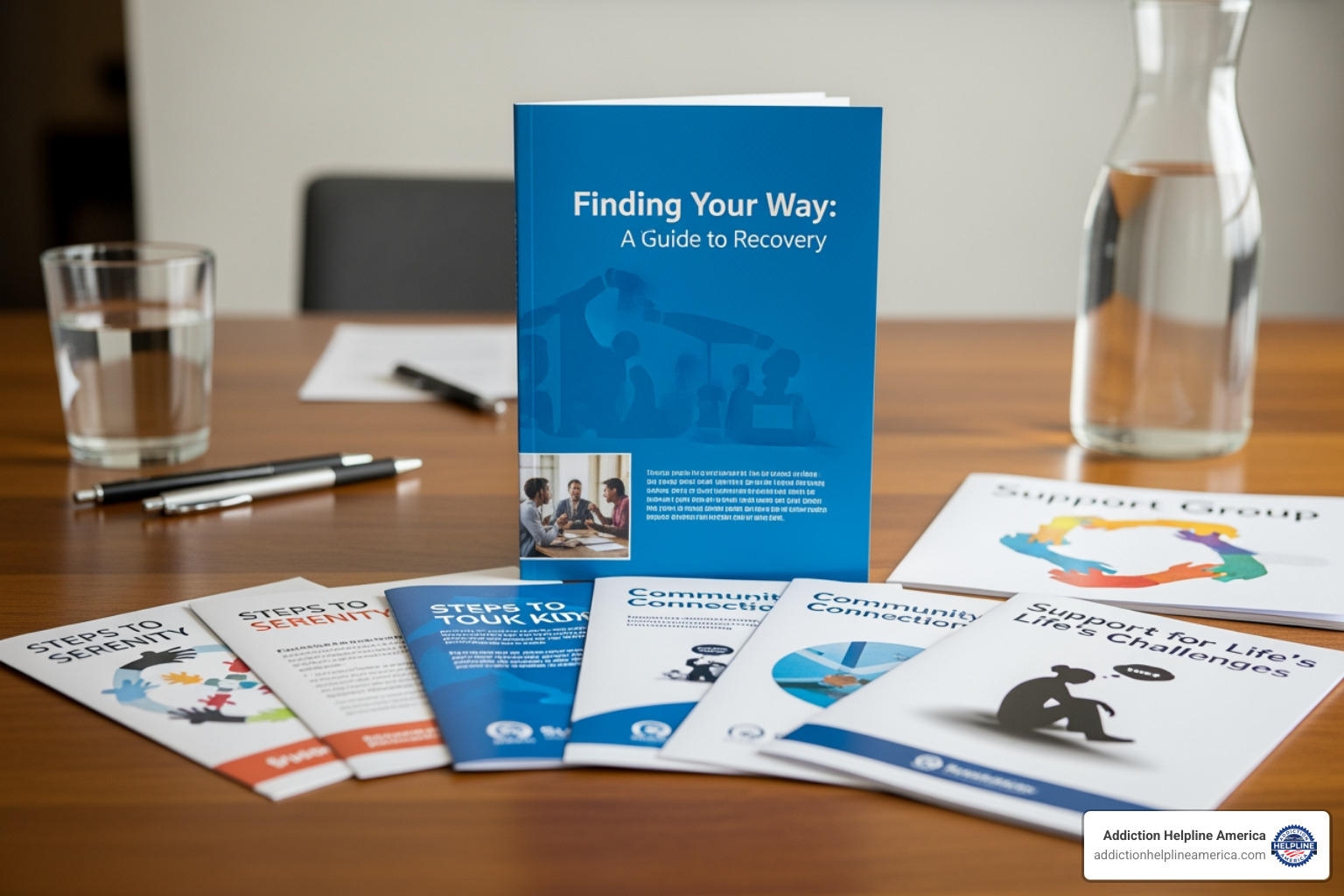
Stronger Together: Understanding Family Support When Addiction Strikes
When a loved one struggles with addiction, the entire family feels the impact. Finding Family support addiction resources is crucial for healing, not just for the individual but for everyone affected.
What is Family Support for Addiction?
Family support can include support groups like Nar-Anon or Al-Anon, professional family therapy, educational programs, and helplines that provide immediate assistance. Addiction is often called a “family disease” because its ripple effect touches everyone, leading to deep emotional pain. In fact, studies show that 63% of family members experience significant emotional distress when a loved one is battling addiction.
Despite the pain, hope and healing are possible. This guide will help you understand what family support means and find the right path for your family.
Here at Addiction Helpline America, we understand the unique struggles families face. We offer compassionate, confidential support, connecting you with vital resources for lasting recovery.

Simple guide to Family support addiction terms:
Call Now – Your Journey to Recovery Begins Today!

Take the first step towards a healthier life! Call now to connect with our compassionate team and start your recovery journey today. Your path to healing awaits!
Our recovery specialists are available 24/7 to provide support, and all calls are confidential and free. Reach out anytime – we’re here to help!
Why Your Well-being Matters: The Power of Family Support in Addiction Recovery
When addiction touches your family, the stress and worry ripple outward. While trying to help your loved one, it’s easy to forget your own health and well-being. This burden takes a real, measurable toll. Research shows that families not engaged in Family support addiction groups face three times the risk of experiencing anxiety and depression.
The impact isn’t just emotional. Living with chronic stress from a loved one’s addiction increases the risk of chronic health conditions, including heart disease and weakened immune systems. Your body stays in a constant state of high alert, which is unsustainable.
Fortunately, when family members seek support, everything begins to shift. Studies reveal that 78% of family members who participate in support groups report improved well-being. This means less stress, better emotional balance, and a renewed sense of hope.
There’s another powerful benefit: 82% of participants experience increased empowerment, moving from helplessness to feeling capable of handling challenges. This shift changes everything, allowing you to become an active participant in your family’s healing.
Your well-being also directly impacts your loved one’s recovery. Research on family support and patient outcomes demonstrates that when families are supported, individuals with addiction have significantly higher rates of entering treatment and maintaining long-term recovery. Your healing helps their healing.
The risks of handling this alone are serious. Isolation often leads to painful cycles of blame and resentment, which can damage relationships and make it harder for your loved one to recover.
Reaching out for help isn’t admitting defeat. It’s recognizing that you deserve support, and that taking care of yourself is one of the most powerful things you can do for your entire family.
A Deep Dive into Nar-Anon: Hope and Healing for Families of Addicts
Nar-Anon Family Groups provide a vital lifeline for those affected by someone else’s addiction. It’s a worldwide fellowship built on a 12-Step program, but its primary focus is on the self-recovery of the family members themselves.
In Nar-Anon, you learn that you didn’t cause the addiction, you can’t control it, and you can’t cure it. This realization is incredibly liberating. Through sharing experiences in a safe, confidential, and judgment-free space, members find understanding and a path to serenity. The core principles are its Twelve Steps and Twelve Traditions, which offer a spiritual framework for personal growth. Members often report a profound sense of relief, realizing they are not alone.
What is Narateen?
Addiction’s shadow can fall heavily on young people. Narateen is a part of Nar-Anon specifically for teenagers (ages 13-19) affected by a loved one’s addiction. It offers a safe space where teens can connect with peers, learn crucial coping skills, and understand they are not responsible for their loved one’s choices. For a valuable resource, consider the Thirty-One Days in Narateen Daily Reader Booklet.
Nar-Anon Resources and How to Find a Meeting

Starting with Nar-Anon means you have a wealth of resources. Literature, from the foundational “Blue Booklet” to daily readers, offers insights and personal stories, many available through the Nar-Anon Literature Store. Sponsorship, a one-on-one mentorship with an experienced member, is another vital component.
Perhaps the most accessible resource is the meeting itself. Nar-Anon offers both in-person and virtual meetings. You can find a group using the meeting finder tool on the main Nar-Anon Family Groups website. At your first meeting, you can expect a warm welcome with no pressure to share. The principle of anonymity is strictly upheld, fostering an environment of trust and safety.
Call Now – Your Journey to Recovery Begins Today!

Take the first step towards a healthier life! Call now to connect with our compassionate team and start your recovery journey today. Your path to healing awaits!
Our recovery specialists are available 24/7 to provide support, and all calls are confidential and free. Reach out anytime – we’re here to help!
Finding the Right Fit: Exploring the Landscape of Family Support Addiction Groups
When searching for Family support addiction resources, there’s no one-size-fits-all solution. The journey to finding the right support is personal, and exploring your options is an investment in your family’s healing. Different groups have different philosophies, so understanding them helps you make an informed choice.
- Nar-Anon: Focuses on recovery for family members of drug addicts. It’s a 12-Step program emphasizing personal growth and serenity.
- Al-Anon: Follows a similar 12-Step structure but is specifically for those affected by someone else’s drinking.
- Families Anonymous: A 12-Step fellowship that welcomes anyone concerned about the drug, alcohol, or related behavioral problems of a relative or friend.
- SMART Recovery Family & Friends: A secular, science-based alternative using tools from cognitive-behavioral therapy. Meetings are facilitator-led and focus on practical coping strategies.
Other Avenues for Family Support for Addiction
The world of Family support addiction extends beyond traditional groups. Other highly effective approaches include:
- Community Reinforcement and Family Training (CRAFT): An evidence-based approach that teaches families how to encourage a loved one to seek treatment through positive reinforcement. You can explore more about this and other evidence-based family models of care.
- Family therapy: Sessions with a licensed therapist help untangle unhealthy communication patterns and rebuild trust.
- Educational programs: Learning about addiction as a brain disease reduces shame and helps you respond with compassion. The SAMHSA Families Family Support Guide is an excellent comprehensive resource.
How to Choose a Support Group
Choosing the right group starts with self-reflection. What do you need most? A place to share feelings or practical tools? A spiritual or secular approach? The specific substance can also guide your choice. Also, consider the format—online meetings offer flexibility, while in-person provides face-to-face connection.
Most importantly, give yourself permission to explore. Visit several different groups to see where you feel welcomed, understood, and hopeful. The right group is the one where you feel safe enough to heal.
Effective Strategies: Busting Myths About Supporting a Loved One

When someone you love is battling addiction, much of the common advice about Family support addiction is outdated or even harmful. It’s time to let go of these misconceptions and adopt approaches rooted in compassion and science.
Common Myths About Family Support Addiction
- Myth: Codependency and enabling are the family’s fault. This damaging label shifts blame onto families who are often just trying to keep a loved one safe. As explored in this expert opinion on the term codependency, your behaviors are often natural responses to a crisis. You deserve compassion, not criticism.
- Myth: You must let them hit “rock bottom.” This is a dangerous idea. Waiting for rock bottom can mean overdose or death. Research on the danger of waiting for rock bottom makes it clear: early intervention saves lives. Recovery can begin at any stage.
- Myth: Tough love is the only effective approach. While boundaries are necessary, “tough love” has been used to justify abandonment or punishment, which can drive a person deeper into isolation. Effective support combines firm limits with love and connection.
- Myth: You are powerless until they want help. This isn’t true. Approaches like Community Reinforcement and Family Training (CRAFT) show that families can actively and positively influence a loved one’s decision to seek treatment. Your actions matter.
Best Practices for Supporting a Loved One
- Focus on your own recovery first. This isn’t selfish—it’s survival. Seeking your own support through groups or therapy equips you to be a stable presence for your loved one.
- Practice detachment with love. This means you can care deeply about someone without being consumed by their choices or trying to control the uncontrollable.
- Set and maintain healthy boundaries. Boundaries protect your well-being and teach your loved one that their actions have consequences. This might mean saying no to requests for money or not allowing substance use in your home.
- Use positive communication techniques. Instead of accusations, use “I” statements to express your feelings (“I feel scared when…”). Listen to understand, even when you don’t agree.
- Learn about harm reduction. This is about meeting people where they are and supporting them in staying safer while they work toward recovery.
- Educate yourself on the science of addiction. Understanding that addiction is a brain disease, not a moral failing, makes it easier to respond with compassion rather than frustration.
Call Now – Your Journey to Recovery Begins Today!

Take the first step towards a healthier life! Call now to connect with our compassionate team and start your recovery journey today. Your path to healing awaits!
Our recovery specialists are available 24/7 to provide support, and all calls are confidential and free. Reach out anytime – we’re here to help!
Frequently Asked Questions about Family Addiction Support
It’s normal to have questions when a loved one is struggling with addiction. Here are clear answers to some of the most common questions we hear from families navigating Family support addiction.
What is the first thing I should do if I suspect a loved one is using drugs?
First, educate yourself on the common signs of substance use. Next, and most importantly, seek your own support immediately. Talk to a therapist, a trusted friend, or a support group like Nar-Anon. When you’re ready, plan a non-confrontational conversation. Choose a calm time and use “I” statements like, “I feel worried when I see…” to express your concerns without blame or accusations, which will only make them defensive.
How can I help if they refuse treatment?
It’s heartbreaking when a loved one refuses help, but you are not powerless. Explore the CRAFT Model (Community Reinforcement and Family Training), which teaches you how to use positive reinforcement to encourage treatment. Continue setting and enforcing healthy boundaries to protect your own well-being and help them face the natural consequences of their actions. While you shouldn’t give up hope, it’s important to manage your expectations. Above all, prioritize your own well-being and safety.
How do I manage the financial strain of a loved one’s addiction?
Addiction can devastate a family’s finances. It’s critical to protect your assets, which may involve consulting a financial advisor or setting up separate accounts. You must also avoid financial enabling. Giving money that supports the addiction only prolongs the problem, so set firm boundaries. Seeking financial counseling can help you create a budget and a plan to stabilize your household. If your loved one becomes willing to get help, understanding insurance options for treatment is a crucial next step. Addiction Helpline America can provide free, confidential guidance on insurance and treatment options that fit your financial situation.
Conclusion: Taking the First Step Toward Family Recovery
Navigating addiction within a family is a profound challenge, but you are far from alone. The path toward healing is one that countless families have walked before.
This guide has covered the importance of your well-being, explored resources like Nar-Anon and SMART Recovery, discussed helpful approaches like CRAFT, and busted harmful myths about Family support addiction. Healing is a journey, not a destination. With effort and support, progress is always possible. We can’t stress enough the critical importance of self-care. Taking care of yourself makes you a stronger, more resilient presence for your loved one.
Here at Addiction Helpline America, we truly understand the unique struggles families face. We connect individuals nationwide to addiction and mental health treatment centers, offering free, confidential, and personalized guidance to find the best recovery program for your family’s needs.
You don’t have to steer this challenging time on your own. Let us help lighten your load. Find personalized help and resources for your family today.
Our helpline is 100%
free & confidential
If you or someone you care about is struggling with drug or alcohol addiction, we can help you explore your recovery options. Don’t face this challenge alone—seek support from us.
Programs
Resources
Will my insurance
cover addiction
treatment?
We're ready to help
Find the best
drug or alcohol treatment
center
Are you or a loved one struggling with addiction? Call today to speak to a treatment expert.















